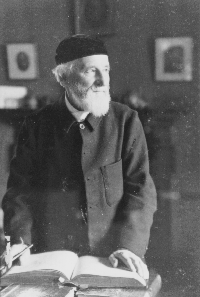Source: Flatland: A Romance of Many Dimensions (1884), PART II: OTHER WORLDS, Chapter 18. How I came to Spaceland, and What I Saw There
Context: An unspeakable horror seized me. There was a darkness; then a dizzy, sickening sensation of sight that was not like seeing; I saw a Line that was no Line; Space that was not Space: I was myself, and not myself. When I could find voice, I shrieked aloud in agony, "Either this is madness or it is Hell." "It is neither," calmly replied the voice of the Sphere, "it is Knowledge; it is Three Dimensions: open your eye once again and try to look steadily."I looked, and, behold, a new world! There stood before me, visibly incorporate, all that I had before inferred, conjectured, dreamed, of perfect Circular beauty. What seemed the centre of the Stranger's form lay open to my view: yet I could see no heart, nor lungs, nor arteries, only a beautiful harmonious Something — for which I had no words; but you, my Readers in Spaceland, would call it the surface of the Sphere.
Edwin Abbott Abbott Quotes
Source: Flatland: A Romance of Many Dimensions (1884), PART I: THIS WORLD, Chapter 9. Of the Universal Colour Bill
Context: The Art of Sight Recognition, being no longer needed, was no longer practised; and the studies of Geometry, Statics, Kinetics, and other kindred subjects, came soon to be considered superfluous, and fell into disrespect and neglect even at our University. The inferior Art of Feeling speedily experienced the same fate at our Elementary Schools.... Year by year the Soldiers and Artisans began more vehemently to assert — and with increasing truth — that there was no great difference between them and the very highest class of Polygons, now that they were raised to an equality with the latter, and enabled to grapple with all the difficulties and solve all the problems of life, whether Statical or Kinetical, by the simple process of Colour Recognition. Not content with the natural neglect into which Sight Recognition was falling, they began boldly to demand the legal prohibition of all "monopolizing and aristocratic Arts" and the consequent abolition of all endowments for the studies of Sight Recognition, Mathematics, and Feeling. Soon, they began to insist that inasmuch as Colour, which was a second Nature, had destroyed the need of aristocratic distinctions, the Law should follow in the same path, and that henceforth all individuals and all classes should be recognized as absolutely equal and entitled to equal rights.
Source: Flatland: A Romance of Many Dimensions (1884), PART II: OTHER WORLDS, Chapter 19. How, Though the Sphere Showed Me Other Mysteries of Spaceland, I Still Desired More; and What Came of It
Source: Flatland: A Romance of Many Dimensions (1884), PART II: OTHER WORLDS, Chapter 17. How the Sphere, Having in Vain Tried Words, Resorted to Deeds
Source: Flatland: A Romance of Many Dimensions (1884), PART I: THIS WORLD, Chapter 4. Concerning the Women
Source: Flatland: A Romance of Many Dimensions (1884), PART I: THIS WORLD, Chapter 12. Of the Doctrine of our Priests
Source: Flatland: A Romance of Many Dimensions (1884), PART II: OTHER WORLDS, Chapter 16. How the Stranger Vainly Endeavoured to Reveal to Me in Words the Mysteries of Spaceland
Source: Flatland: A Romance of Many Dimensions (1884), PART II: OTHER WORLDS, Chapter 18. How I came to Spaceland, and What I Saw There
“The very fact that a Line is visible implies that it possesses yet another Dimension.”
Source: Flatland: A Romance of Many Dimensions (1884), PART II: OTHER WORLDS, Chapter 16. How the Stranger Vainly Endeavoured to Reveal to Me in Words the Mysteries of Spaceland
Source: Flatland: A Romance of Many Dimensions (1884), PART II: OTHER WORLDS, Chapter 20. How the Sphere Encouraged Me in a Vision
Source: Flatland: A Romance of Many Dimensions (1884), PART I: THIS WORLD, Chapter 2. Of the Climate and Houses in Flatland
“From dreams I proceed to facts.”
Source: Flatland: A Romance of Many Dimensions (1884), PART II: OTHER WORLDS, Chapter 15. Concerning a Stranger from Spaceland
Source: Flatland: A Romance of Many Dimensions (1884), PART I: THIS WORLD, Chapter 12. Of the Doctrine of our Priests
Source: Flatland: A Romance of Many Dimensions (1884), PART I: THIS WORLD, Chapter 12. Of the Doctrine of our Priests
Source: Flatland: A Romance of Many Dimensions (1884), PART I: THIS WORLD, Chapter 11. Concerning our Priests
Source: Flatland: A Romance of Many Dimensions (1884), PART I: THIS WORLD, Chapter 5. Of Our Methods of Recognizing One Another
Preface to the Second and Revised Edition (1884)
Flatland: A Romance of Many Dimensions (1884)
Source: Flatland: A Romance of Many Dimensions (1884), PART II: OTHER WORLDS, Chapter 17. How the Sphere, Having in Vain Tried Words, Resorted to Deeds
Source: Flatland: A Romance of Many Dimensions (1884), PART II: OTHER WORLDS, Chapter 20. How the Sphere Encouraged Me in a Vision
Source: Flatland: A Romance of Many Dimensions (1884), PART II: OTHER WORLDS, Chapter 16. How the Stranger Vainly Endeavoured to Reveal to Me in Words the Mysteries of Spaceland
Source: Flatland: A Romance of Many Dimensions (1884), PART I: THIS WORLD, Chapter 4. Concerning the Women
Source: Flatland: A Romance of Many Dimensions (1884), PART II: OTHER WORLDS, Chapter 16. How the Stranger Vainly Endeavoured to Reveal to Me in Words the Mysteries of Spaceland
